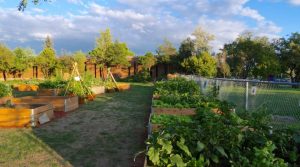Unit 3 reflections look into the process of researching, organizing and reviewing my formal report. This post details any problems I encountered while collecting data, and anything I learned from the collection or interview process. It chronicles my writing process of the report and the self-awareness I gained from reviewing my peer’s report.
Researching
The primary research (survey and interviews) went smoothly. I had a higher response rate my survey than anticipated. Even though all questions were voluntary, every person who answered the survey, answered every question. I had some doubts about how I can formulate my results into facts, since my sample is not representative of the Statistics Canada employee population. I also had an interview with the City of Ottawa Community Garden coordinator, Joshua. The interview went smoothly, and Joshua was able to answer all my questions in detail. I found it challenging to write down everything he was saying, but was nonetheless was able to jot down some memorable information, such as what he envisions Tunney’s Pasture to be like with a community garden.
Overall, the secondary research part of the report was difficult to find certain information. I was looking to find basic information about composting, as well as some composting facts. There were many news articles about composting, but it was hard to find any peer-reviewed articles that contained the basic information that I needed. Statistics Canada and the City of Ottawa were good sources to find statistics related to composting, as well as the City of Ottawa was a good source to research the current composting initiatives in the city.
Organizing and Writing the Formal Report
I did not find organizing my information to be too difficult. I mainly relied on my Report Outline that was posted on the team forum as a guide.
As mentioned, I found it difficult to formulate my results from the survey into meaningful results, since my survey sample is not representative. All results are displayed in terms of the respondents, but none of the results can be generalized to the Statistics Canada employee population. I find that without this, the survey results do not help make a convincing argument. Asides from that, I found my interview with Joshua to be very eye-opening. Since he knows a lot about community gardens, he told me that my original idea of having organic waste diverted to community gardens would not work due to the volume of waste. Instead he offered an idea where some of the waste could be diverted, which I was able to articulate the idea in my recommendations.

Brewer park community garden in Ottawa (credit: Gardens Ottawa)
Reviewing
I still find reviewing my peers work to be helpful for my own writing. I noticed that sometimes in my peer’s work, there are some organizational or transitional weaknesses, which were existent in my report as well. Noting these also helped me to identify my own mistakes in transitions. The peer review is also helpful when there is a template. For example, the template Dr. Paterson provided us contained questions about content, organization, style, and design, that were all useful for self-editing. Every point in the template I could use to assess my peer’s writing and my own report.
